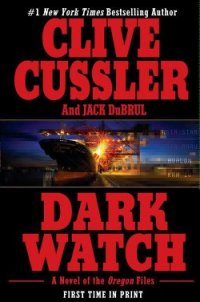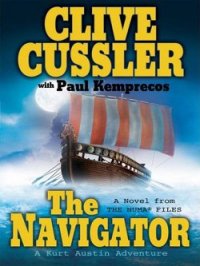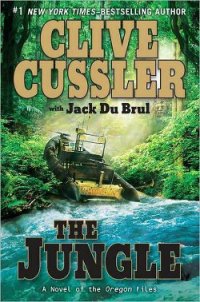Night Probe! - Cussler Clive (онлайн книги бесплатно полные txt) 📗
The President fell silent. By education and occupation he was an attorney, a precise and analytical man-and yet scientific data was beyond him. He did not wish to appear stupid in front of the admiral. He chose his words carefully.
"Surely your people don't intend to literally claw a path through an acre of steel."
"No, there is a better method."
"Like explosives perhaps?"
"Too risky." Sandecker replied matter-of-factly. "The steel in the wreck has been under attack by corrosive elements for seventy-five years. It has become porous and its tensile strength is greatly reduced. A charge in the wrong place or one too strong, and the whole ship could collapse in on itself. No, we'll cut our way through."
"With acetylene cutting torches, then."
"With pyroxone."
"Never heard of it."
"A pliable incendiary substance that can burn under water at an incredibly high temperature for pre controlled lengths of time. Once pyroxone is molded against the surface to be separated, it is ignited by an electronic signal. At three thousand degrees Celsius it will melt any barrier in its way, including rock."
"It's hard to imagine."
"If I can answer any more questions."
The President made a disparaging gesture. "No, I'm satisfied. You and your people are doing a remarkable job."
"If we don't come up with the treaty, you'll know we did all that was technically possible."
"I gather you're not too hopeful."
"Frankly, Mr. President, I think we have about as much chance as a titmouse in a buzzard's beak."
"What are your feelings concerning the treaty on the Manhattan Limited?"
"I'll save any comment until we find the train."
"At least I know your position," the President said, smiling.
Sandecker suddenly looked wolfish. "Sir, I have a question."
"Go ahead."
"May I respectfully ask just what in hell this is all about?"
It was the President's turn to look wolfish. "You may well ask, Admiral, but all I'm going to tell you is that the scheme is crazy," he said with an ill-boding look in his eyes. "The craziest scheme ever hatched by a president of the United States.
The silence in the dense green depths of the St. Lawrence River was broken by a strange whirring sound. Then a thin shaft of bright bluish light sliced into the cold water, slowly increasing in dimension until it became a large rectangle. A school of curious fish, attracted by the brilliant glow, swam toward it in languid circles, seemingly uncaring of the blurred shadows that wavered above them.
Inside the huge center well of the Ocean Venturer a team of engineers readied a remote-search vehicle that hung suspended by a cable-from a small crane. One man adjusted the light source units for the three cameras while another linked up the battery power supply.
The RSV was shaped like an elongated teardrop, only three feet long and ten inches in diameter, and showed no protrusions on its smooth titanium skin. Steering and propulsion were provided by a small hydrojet pump with variable thrusters.
Heidi stood on the edge of the well opening and peered at the fish below.
"A strange feeling," she said. "Looking at water inside a ship and wondering why, we not sinking."
"Because you're standing four feet above the surface," Rudi Gunn answered her with a grin. "So long as the river can't penetrate below the waterline, we stay afloat."
One of the engineers waved his hand. "It's buttoned up."
"No umbilical cable for electronic control?" asked Heidi.
"Baby responds by remote sound impulses up to three miles under water," explained Gunn briefly.
"You call it Baby?"
"That's because it's usually wet," Pitt laughed.
"Men and their juvenile humor," she said, shaking her head.
Pitt turned to the well. "Diver in," he ordered.
A man encased in a thermal diving suit adjusted his face mask and slipped over the side. He guided the RSV as it was lowered into the well and released it when they both had fallen below the Venturer's keel.
"Now let's move along to the control room and see what's down there," Pitt said.
A few minutes later they were watching three different viewing screens, mounted horizontally. On the opposite side of the room several technicians studied dials and noted instrument readings on clipboards. Against another wall a bank of computers began recording the data transmissions.
A cheerful fat man with curly strawberry hair and freckles stippling his face grinned with a great flash of teeth as Pitt introduced him to Heidi.
"Doug Hoker, meet Heidi Milligan," Pitt said, dropping Heidi's naval rank. "Doug plays mother to Baby."
Hoker half rose out of his chair in front of a large console and shook her hand. "Always glad to have a beautiful audience."
She smiled at the compliment. "This is one opening I didn't want to miss."
Hoker turned back to his console and immediately became all business. "Passing eighty feet," he droned, his right hand on an aircraft control grip. "Water temperature thirty-four degrees."
"Circle Baby in from the stern," said Pitt.
"Acknowledged."
At 165 feet the river bottom appeared on the color video screens, a drab, washed-out brown, devoid of life except for an occasional crab and scattered bits of weed. Visibility under the RSV's high-intensity lights was little more than ten feet.
Gradually a dark shape began to grow from the top of the screen, slowly enlarging until its huge pintles could be clearly seen.
"Nice sense of direction," Pitt said to Hoker. "You laid it dead on the rudder."
"Something else coming up," Gunn announced. "The propeller, by the looks of it."
The four great bronze blades that once had driven the 14,000ton ship from Liverpool to Quebec on many crossings moved at a funereal pace past the camera eyes of the RSV.
"About twenty feet from tip to tip," Pitt judged. "Must weigh at least thirty tons."
"The Empress was a twin-screw vessel," said Heidi softly. "The one on the port side was salvaged in nineteen hundred and sixty-eight.
Pitt turned to Hoker. "Come up fifty feet and travel forward along the starboard boat deck."
Deep beneath their feet the little sub obeyed its impulse commands and swam over the stern railing, narrowly missing the staff that had once flown the ensign of the Empress' home port.
"The aft mast is down," Pitt said in a monotone. "The rigging appears to be gone."
Then the boat deck came into view. A few of the davits hung empty, but some still held steel lifeboats frozen for eternity in their chocks. The ventilators stood in silent agony, their buff colored paint long flaked away, but the two funnels had vanished, fallen decades before into the silt.
No one spoke for a few minutes. It was as though they could somehow reach into the past and sense the hundreds of frightened men, women and children milling the decks in confusion, helplessly feeling the ship sink beneath them with terrible swiftness.
Heidi's heart began to pound against her breast. There was a morbid aura about the scene. Seaweed, clinging to the rust eaten hulk, swayed eerily to and fro with the current. She shivered involuntarily and clasped her hands together to keep them from trembling. Finally Pitt broke the silence. "Take it inside." Hoker took a handkerchief from his pocket and wiped the nape of his neck.




